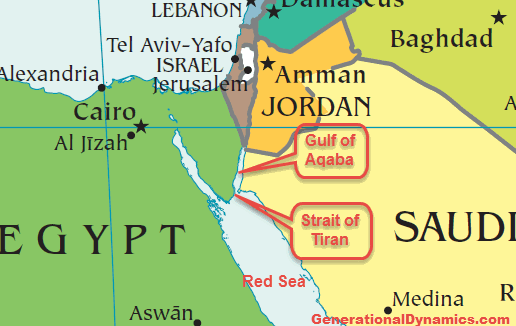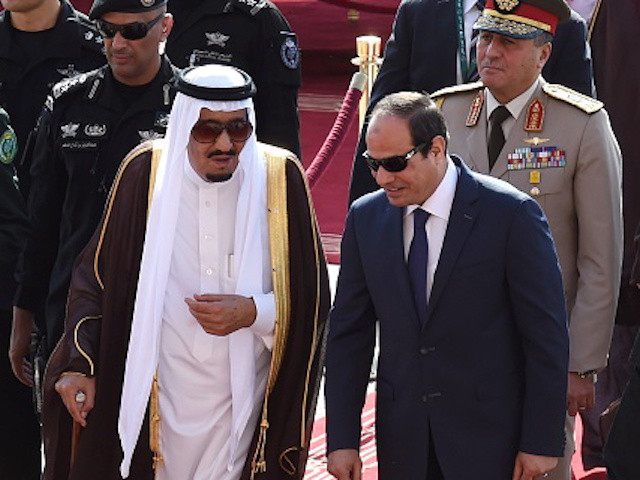This morning’s key headlines from GenerationalDynamics.com
- Egypt, Saudi Arabia to build a huge bridge where Moses parted the Red Sea
- Saudi Arabia will no longer provide ‘free money’ to Egypt
Egypt, Saudi Arabia to build a huge bridge where Moses parted the Red Sea

Map showing the Red Sea, Strait of Tiran, and Gulf of Aqaba
Saudi Arabia and Egypt have announced plans to build the King Salman Bridge, named after the current leader of Saudi Arabia, Salman bin Abdulaziz al Saud.
The bridge will be an enormous project, 10-20 miles (16-32 km) long, depending on its position, providing a land connection between Saudi Arabia and Egypt.
The bridge is planned to cross the Strait of Tiran, at the same place where the prophet Moses is said to have parted the Red Sea, in order to bring his people out of slavery into the Promised Land.
Whether the bridge will actually ever be built remains to be seen. The construction project could badly affect tourism at the Sharm el-Sheikh resort on the Red Sea near the Strait of Tiran. Furthermore, environmentalists are complaining that the construction project would damage fragile sea life.
The Strait of Tiran has a more modern significance as well. For many years after Israel’s founding, the Suez Canal was closed to Israeli shipping, so ships carrying goods to Israel had to pass through the Strait of Tiran and travel up the Gulf of Aqaba to reach Egypt.
On May 23, 1967, Egypt’s President Gamal Abdel Nasser announced that the United Arab Republic would close the Strait of Tiran and Gulf of Aqaba to all ships flying Israel flags or carrying strategic materials. Israel had already warned that any such move would be considered an act of war, and the announcement did launch the 1967 Six-Day War between Egypt and Israel.
As part of the same announcement on Saturday, the countries agreed to settle a long-standing dispute over the sovereignty of the Sanafir and Tiran islands in the Strait of Tiran. Until now, they had been Egypt’s sovereign territory. After the Six-Day War, Israel occupied the two islands from 1967 until the full implementation of the Israel-Egypt peace treaty in 1982. Since then, and continuing to today, there are US-led “Multinational Force Observers” (MFO) there. Now that control of the islands is being transferred from Egypt to Saudi Arabia, it remains to be seen whether there will be any effect on the MFO or on Israeli shipping. Egyptian Streets and Arab News and Ynet
Saudi Arabia will no longer provide ‘free money’ to Egypt
With the Arab world in continuing turmoil since the “Arab Awakening” in 2011, the lengthy visit by Saudi Arabia’s King Salman bin Abdulaziz al Saud to Cairo and Egypt’s president Abdel al-Fattah al-Sisi is being described as historic. Egypt, with nearly 93 million citizens, is the most populous Arab country with the largest military in the region, while Saudi Arabia is the leader of the Muslim world and has the region’s largest economy. The two leaders have signed agreements for 12 development projects in the Sinai, and other projects totally $22 billion.
When Mohamed Morsi and the Muslim Brotherhood were the governing party of Egypt in 2013, Qatar, which joined Turkey in supporting the Muslim Brotherhood, gave billions of dollars in aid to Egypt. When Morsi was deposed in an army coup led by Abdel al-Fattah al-Sisi on July 3, 2013, Qatar’s aid to Egypt ended. After that. Saudi Arabia, United Arab Emirates (UAE) and Kuwait starting giving aid to Egypt.
As part of this week’s joint announcements, Saudi Arabia has said that it will no longer give “free money” to Egypt. Instead, future aid will be given in the form of investments and loans that will have to be repaid.
There are two reasons for this change. One is that with the collapse in oil prices, Saudi Arabia is not able to spend as much, and by making loans and investments, the Saudis diversify their sources of revenue.
The second is that Egypt’s economy has been struggling since the ouster of long-time leader Hosni Mubarak in 2011, and the current president Abdel al-Fattah al-Sisi has been unable to turn the economy around, or to deal effectively with the entrenched corruption. Arab News and Reuters and Arab News
KEYS: Generational Dynamics, Saudi Arabia, Salman bin Abdulaziz al Saud, Egypt, Abdel al-Fattah al-Sisi, Israel, Suez Canal, Red Sea, Strait of Tiran, Gulf of Aqaba, Gamal Abdel Nasser, Six-Day War, Mohammed Morsi, Muslim Brotherhood, Qatar, Turkey, Hosni Mubarak
Permanent web link to this article
Receive daily World View columns by e-mail

COMMENTS
Please let us know if you're having issues with commenting.